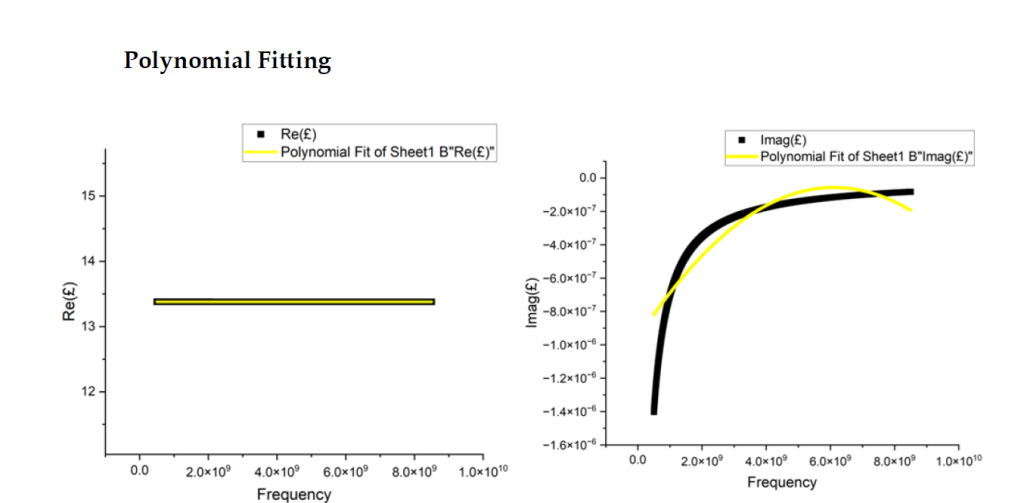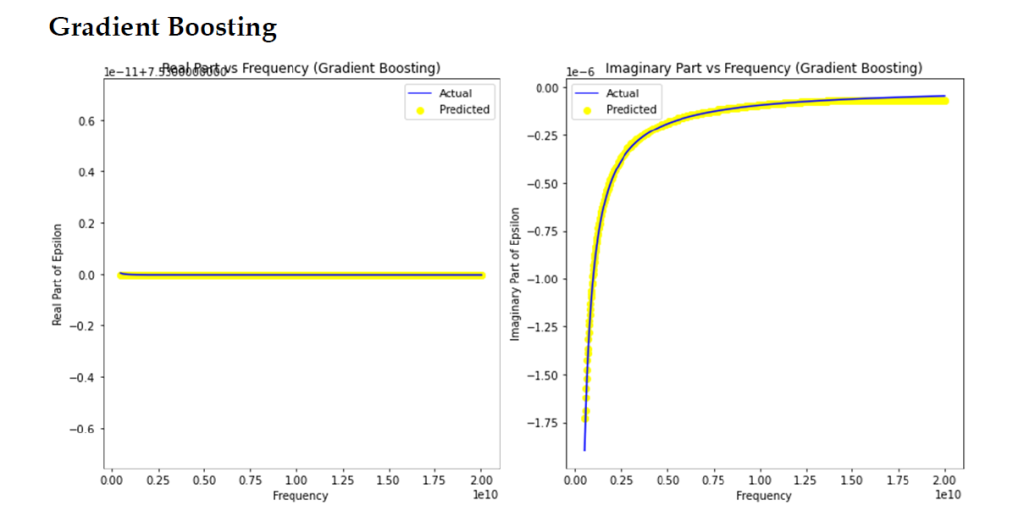Research News
- Exploring the Exciting Potential of 6G Networking June 7, 2024
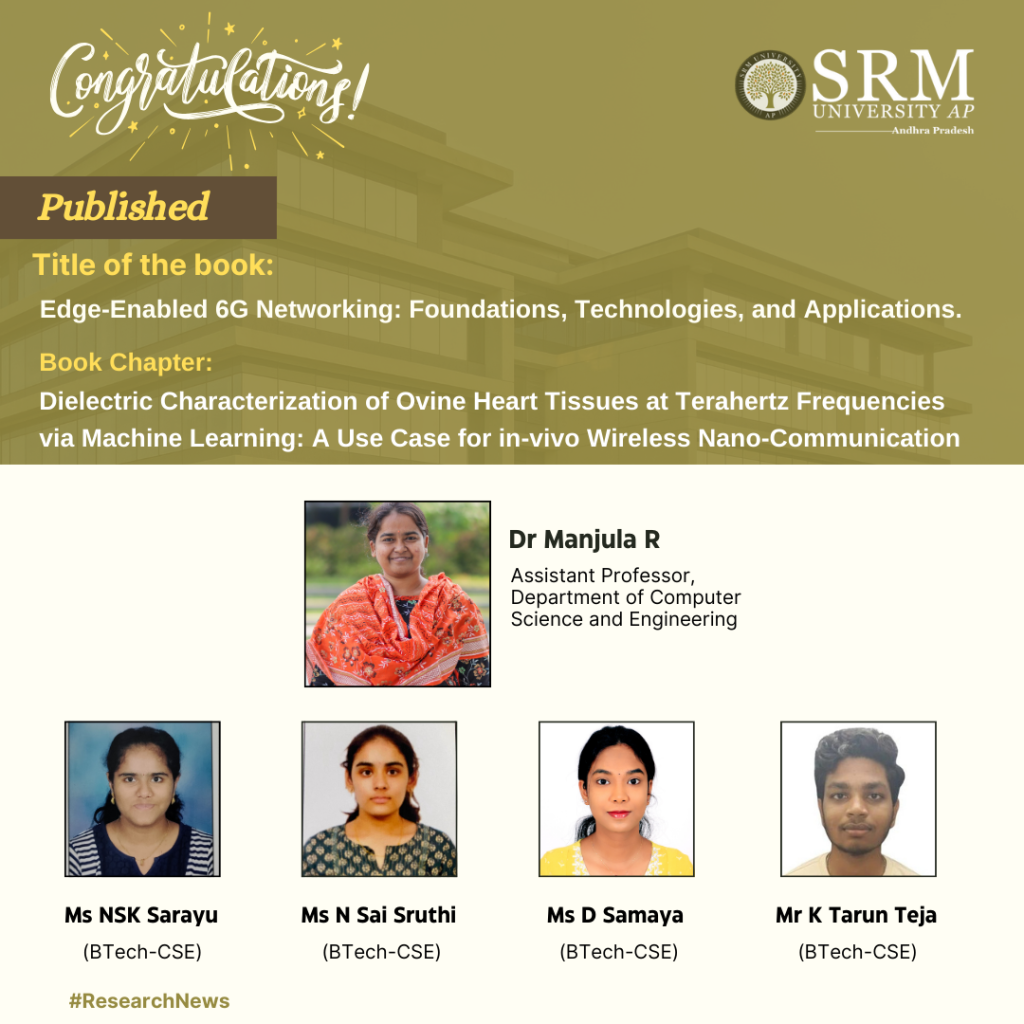
The Department of Computer Science and Engineering is proud to announce the acceptance of the book chapter titled, Dielectric Characterization of Ovine Heart Tissues at Terahertz Frequencies via Machine Learning: A Use Case for in-vivo Wireless Nano-Communication in the book, “Edge-Enabled 6G Networking: Foundations, Technologies, and Applications.” The book chapter by Dr Manjula R and her students, Ms NSK Sarayu, Ms N Sai Sruthi, Ms D Samaya, and Mr K Tarun Teja from the department caters to UG/PG and PhD students, educational institutions, and medical healthcare sectors. Dr Manjula’s research doesn’t just underscore the significance of understanding the dielectric properties of heart tissues but also highlights the transformative potential of machine learning in predicting, diagnosing and offering therapeutic interventions equipped with real-time monitoring capabilities. The research also lays the groundwork for future advancements in this field, facilitating the development of more efficient and reliable in-vivo sensing technologies.
Abstract of the Book Chapter:
A new generation of sensing, processing, and communicating devices at the size of a few cubic micrometers are made possible by nanotechnology. Such tiny devices will transform healthcare applications and open up new possibilities for in-body settings. A thorough understanding of the in-vivo channel characteristics is essential to achieve efficient communication between the nanonodes floating in the circulatory system (here, it is the heart) and the gateway devices fixed in the skin. This entails one to have accurate knowledge on the dielectric properties (permittivity and conductivity) of cardiac tissues in terahertz band (0.1 to 10 THz). This research examines the strength of the machine learning models in accurate calculation of the dielectric properties of the cardiac tissues. Initially, we generate the data using 3-pole Debye Model and then use machine learning models (Linear Regression, Polynomial Regression, Gradient Boosting, and KNN), on this data, to estimate the dielectric properties. We compare the values predicted by machine learning models with those given by the analytical model. Our investigation shows that the Gradient Boosting method has better prediction performance. Further, we have also validated these results using Origin software employing curve fitting technique. In addition, the research also contributes to the study of data expansion by predicting unknown data based on available experimental data, emphasizing the broader applicability of machine learning in biomedical research. The study’s conclusions enhance areas like non-invasive sensing in the context of 6G, which may improve data and monitoring in a networked healthcare environment.
Continue reading → - Examining Karnataka’s Mandate for Signboards: Paper by Dr Vineeth Thomas May 30, 2024
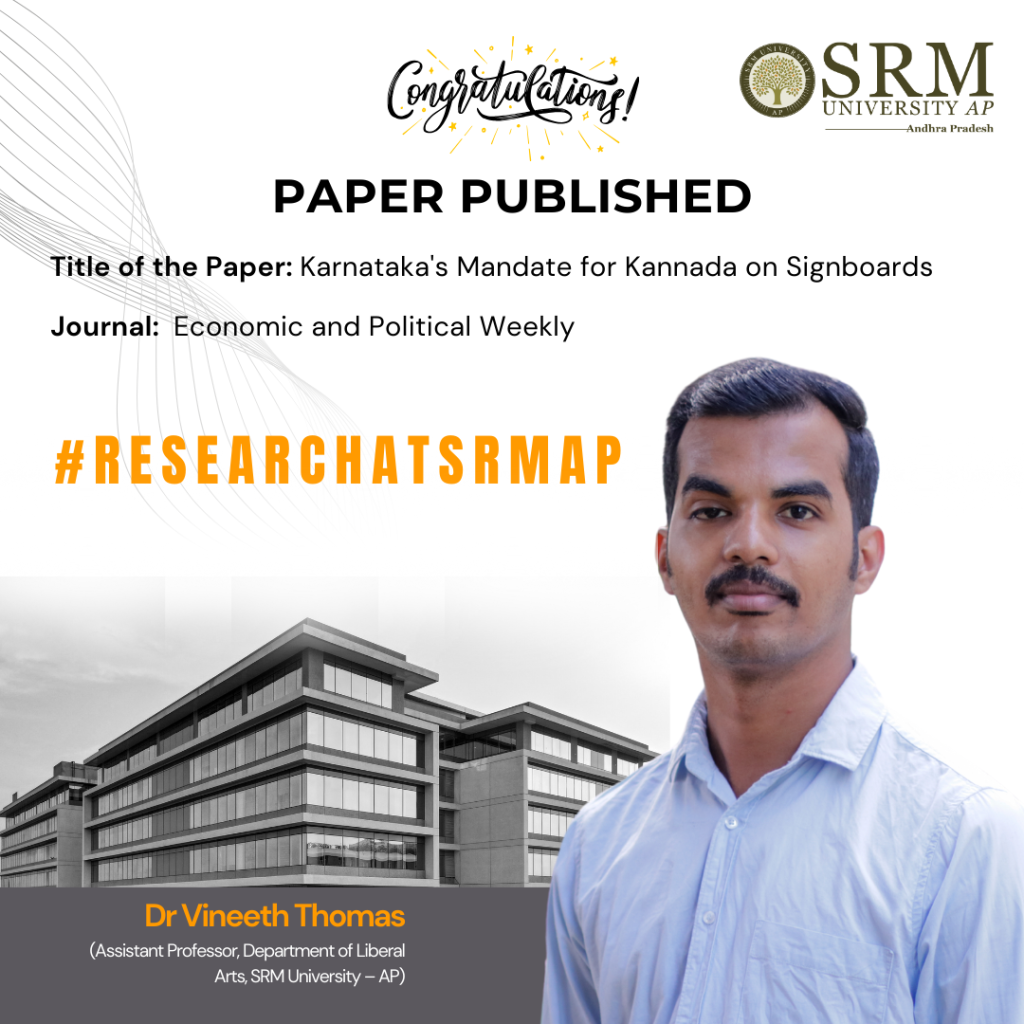
In a research paper published in Economic and Political Weekly, Dr Vineeth Thomas, an Assistant Professor at the Department of Liberal Arts, delves into the socio-political and economic implications of the “Karnataka’s Mandate for Kannada on Signboards” amendment. The article highlights the social and cultural significance of the amendment and raises awareness about the potential economic challenges it may pose. This insightful paper not only makes for an engaging read but also serves as a valuable resource for policymakers and politicians, bringing attention to the practical and social implications of the amendment.
Abstract
The Kannada Language Comprehensive Development (Amendment) Bill, 2024, ratified by the Karnataka Legislative Assembly and Legislative Council, stands as a legislative landmark with profound implications. This commentary critically analyses the socio-economic-political implications, unravelling the intricate web of influences that the Kannada Language Comprehensive Development Bill introduces within the diverse and dynamic landscape of Karnataka.
Citation
Roshmi Antony, Vineeth Thomas, Lulubala Nayak (2024)-, Karnataka’s Mandate for Kannada on Signboards, Economic and Political Weekly, ISSN (Online) – 2349-8846 (SCOPUS /ABDC Indexed)
Continue reading → - MOU Signed with IGCAR for Cutting-edge Biomedical Research May 28, 2024
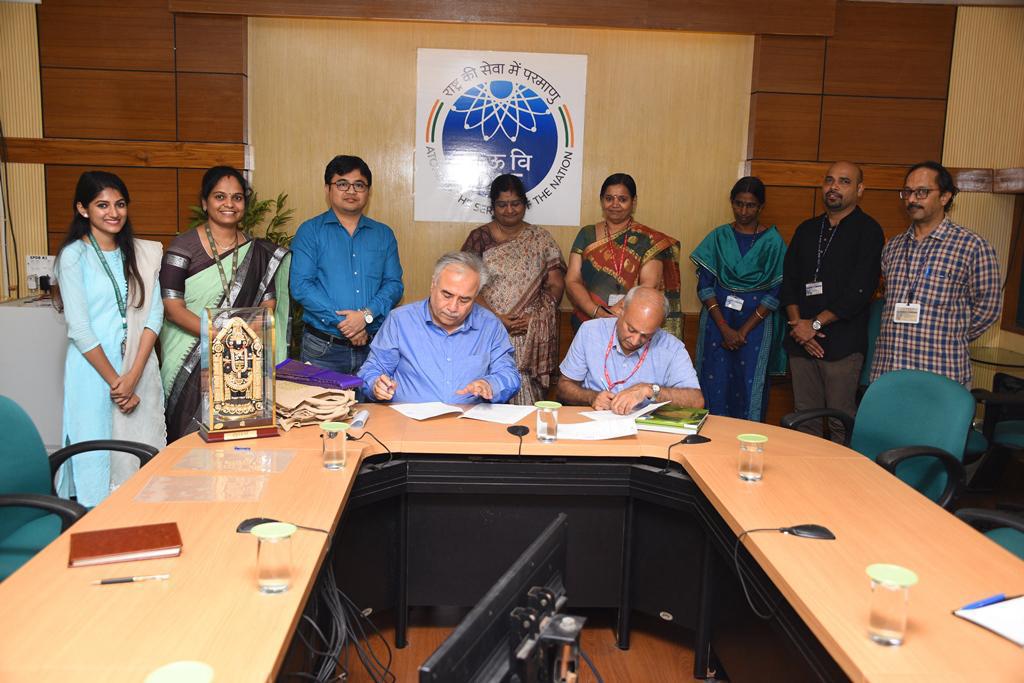
“This is a remarkable opportunity for our students to enhance their fields of study, gain academic insights from expert scientists and participate in cutting-edge research projects at IGCAR. This will ensure that we at SRM AP nurture students with a great scientific temperament,” stated Prof. Manoj K Arora, Vice Chancellor of SRM University-AP on signing the MOU with IGCAR.
SRM University-AP has signed a Memorandum of Understanding (MOU) with the Indira Gandhi Centre for Atomic Research (IGCAR) at Kalpakkam, Tamil Nadu, to collaborate on academic and research projects in Biomedical Research, Disaster Management, and other domains. The MOU was signed by Dr B Venkatraman, Director-IGCAR and Prof. Manoj K Arora, Vice Chancellor, SRM University-AP in the presence of Dr Vidya Sundarrajan, Head PHRMD & QAD, IGCAR Kalpakkam, Mrs M Menaka, Head RAMS, RESD, SQRMG, IGCAR, Kalpakkam, Prof. Ranjit Thapa, Dean-Research, SRM AP and Dr K A Sunitha, Associate Professor, SRM AP.
The MoU underscores a mutually beneficial agreement between the two institutes. On the academic front, the MOU provides internship opportunities, research collaboration for projects and industry visits for the students and faculty of SRM AP. This ensures a knowledge transfer between the two organisations, promoting stellar growth in scientific and technological advancements.
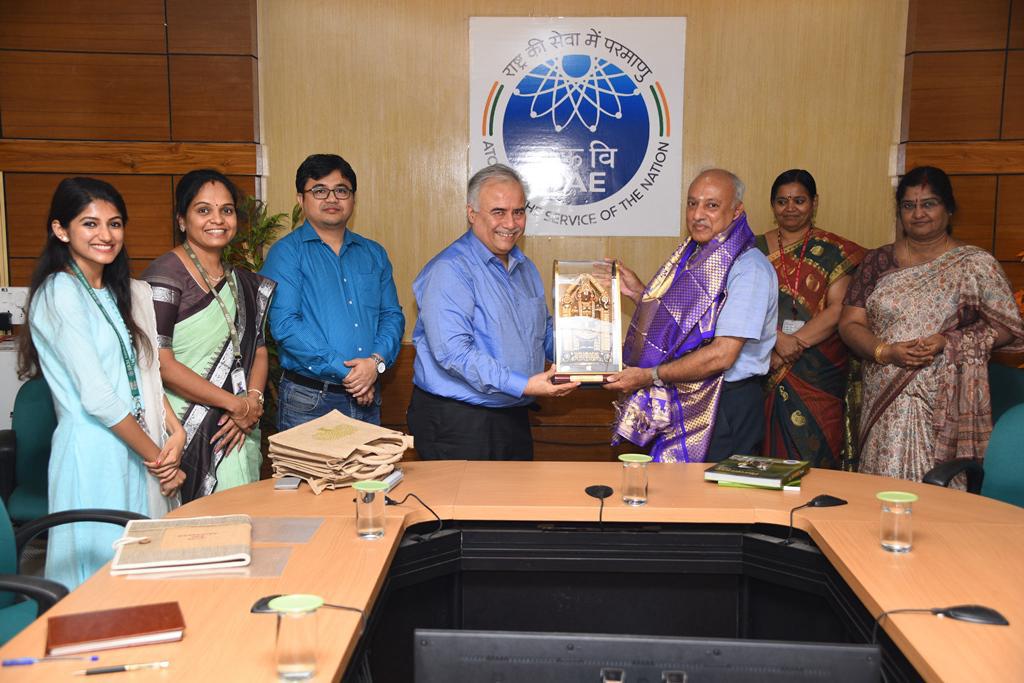
SRM AP has already collaborated with IGCAR on a consultancy project in the pioneering field of Biomedical Research last year. The parties have successfully conducted health screening of over 1500 subjects in the Chengalpattu region in Tamil Nadu, with SRM Medical Hospital & Research Centre and AIIMS Mangalagiri as secondary collaborators. Upon the successful completion of the project, IGCAR and SRM University-AP further extend their association with an official MOU for academic and research collaborations. “The MOU with SRM University-AP for translational research will be a huge motivation for the young faculty and scholars to pursue breakthrough research in their scientific domains,” remarked Dr B Venkatraman, Director-IGCAR.
Both institutes plan to extend their collaborative health screening project to the state of Andhra Pradesh, focusing on the neighbouring villages of SRM AP. Dr K A Sunitha, Project Head from SRM University-AP, opines that this project aims not just the possibility of translational research but also research for the societal cause. This research enables us to understand the correlated factors that influence various health disorders. Prof. Ranjit Thapa, Dean-Research also stated his enthusiasm for the project and expanding their research ventures to other domains.
Continue reading → - Innovative Wind Turbine System Patent Awarded to Dr Goutam Rana and Team May 16, 2024
 In a significant advancement for sustainable energy technology, the Indian Patent Office Journal has officially granted a patent for the “Mini magnetically levitated wind turbine system for power generation.” This groundbreaking invention, bearing Application Number: 202241051560, is the brainchild of Dr Goutam Rana, Assistant Professor in the Department of Electronics and Communication Engineering.
In a significant advancement for sustainable energy technology, the Indian Patent Office Journal has officially granted a patent for the “Mini magnetically levitated wind turbine system for power generation.” This groundbreaking invention, bearing Application Number: 202241051560, is the brainchild of Dr Goutam Rana, Assistant Professor in the Department of Electronics and Communication Engineering.Dr Rana, along with his dedicated team of B. Tech ECE students—Mr Vybagula Sai Vamsi, Mr Moparthi Teja, Mr Indrakanty Satwik, and Mr Pidikiti Venkata Abhinash have developed a system that promises to revolutionise how we harness wind energy. The turbine’s miniaturised and magnetically levitated design allows for efficient power generation with minimal mechanical friction, leading to a longer lifespan and reduced maintenance costs.
The team’s innovation aligns with global efforts to transition to renewable energy sources and showcases the potential of academic research in contributing to real-world challenges. The patent grant not only recognises the technical ingenuity of the invention but also underscores the collaborative spirit of the students and faculty at the institution.Abstract:
Due to the increasing demand and supply gap, in the electrical energy system, wind energy is coming out as an alternative form of clean-with zero-carbon footprint renewable energy sources for power generation. The same is true for hydrocarbon-based fuels whose resources are limited and the contribution of vehicular pollution is also raising concerns in every-degrading the air quality index (AQI) of Indian cities. The electric and hybrid vehicles thus emerging fast as an alternative but often being hindered by the unavailability of proper charging infrastructures on roads.
The current invention is aimed to enable the use of wind turbines for harnessing wind energy and utilize the same to charge batteries of electrical vehicles or hybrid vehicles. The major challenges that have prevented the use so far are mainly two viz. low air flow and larger air drag. To address low airflow in normal road conditions in congested city alleys, we demonstrated the use of magnetically levitated Vertical-axis turbines instead of conventional ball-baring-based Horizontal-axis wind turbines. To reduce the air drag the use of vertical axis magnetically levitated wind turbines is a good option since the air drag experienced in the blade unit is not exactly in contact with the car body.
To improve on the drag further we have introduced an array of mini turbine units instead of one big unit which helps in distributing the total drag over a large area and since air can pass easily through small units overall drag experienced will be small. Also, to keep the levitation small, the rotating unit is made lighter with 3D printing perforated PLA material.
The rest of the operation of the system is similar to any wind turbine system i.e. with the help of permanent magnet and coil arrangement we will convert the wind energy (rotor movement) into electrical energy (e.m.f.). Only here instead of one single source, we will generate multiple small sources of induced electrical energy which can then be coupled together and used for charging the battery.Since the invention uses magnetic levitation, friction is minimal. This helps the rotor to become independent of natural wind flow and use the movement of the vehicle to generate the required torque for the rotor movement. Our invention can be installed in the rooftop space of any vehicle and since it is divided into an array of smaller units, allows the optimum use of available space of the used vehicle. Overall cost and weight are also very minimal. Here, the most practical use case can be the widespread E-rickshaws in India. The choice of the use case is based on the fact of their large presence, longer run hours, and limited speed for the runs.
Explanation of the Invention in Layperson’s Terms:
The invention will act as a source of energy and can be used to charge batteries of electric vehicles or hybrid vehicles. The device converts wind energy to electrical energy through mini wind turbine arrays which can be placed on top of the rooftop of the vehicles. The rotor is kept suspended from the stator unit using magnets to eliminate friction. This helps to operate the device without the presence of strong natural wind, it utilizes the movement of the vehicle to generate the necessary rotation. The mini turbine arrays and magnetic suspension help to reduce the effect of wind drag (extra wind replaced by the turbine unit).Practical Implementation or the Social Implications Associated
The invention is intended to solve a few on-road challenges of Electric Vehicles (EVs). The current invention is:
1. Low cost and one-time investment with zero maintenance charge for an EV
2. The proposed device can act as a secondary power source for the vehicle
3. The proposed device will convert wind energy, thus completely environment-friendly, and with comes with absolutely zero carbon footprint
4. The proposed device can add some extra mileage to the current battery storage as much as it runs.
5. With other renewable sources together a hybrid vehicle can be built which is free of fossil fuel completely.Future Research Plans:
The current invention is in just proof of concept stage. We are currently working on the following
Continue reading →
1. to improve the overall efficacy of the device such that each unit can harness wind energy to its optimal potential. With this, we will try to ensure that the battery gets charged completely (or at least a significant percentage) during each run during the day.
2. We are also working on the numerical study to calculate the actual wind drag with a more optimal design so that we can estimate how many units a certain vehicle will require and what should be the optimal placement scheme to utilize the maximum wind effect. - Groundbreaking Research on Optimal Routing Protocol in IEEE Sensors Journal May 15, 2024
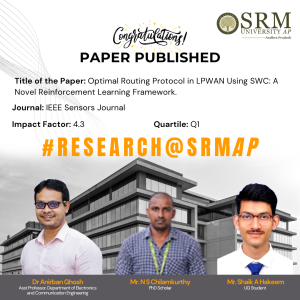 In a significant academic achievement, Dr Anirban Ghosh, Assistant Professor from the Department of Electronics and Communication Engineering along with Mr Naga Srinivasarao Chilamkurthy, PhD Scholar, and Mr Shaik Abdul Hakeem, an undergraduate student, have made a remarkable contribution to the field of communication engineering. Their paper, titled “Optimal Routing Protocol in LPWAN Using SWC: A Novel Reinforcement Learning Framework,” has been published in the esteemed IEEE Sensors Journal, with an impressive impact factor of 4.3.
In a significant academic achievement, Dr Anirban Ghosh, Assistant Professor from the Department of Electronics and Communication Engineering along with Mr Naga Srinivasarao Chilamkurthy, PhD Scholar, and Mr Shaik Abdul Hakeem, an undergraduate student, have made a remarkable contribution to the field of communication engineering. Their paper, titled “Optimal Routing Protocol in LPWAN Using SWC: A Novel Reinforcement Learning Framework,” has been published in the esteemed IEEE Sensors Journal, with an impressive impact factor of 4.3.This publication marks a milestone for the university and highlights the innovative research being conducted by its faculty and students. The paper delves into the development of an optimal routing protocol for Low-Power Wide-Area Network (LPWAN) using State-Wise Communication (SWC), employing a novel reinforcement learning framework to enhance network efficiency and performance.
This work will pave the way for advancements in LPWAN technologies, which are crucial for the Internet of Things (IoT) ecosystem. The university community celebrates this achievement and looks forward to the positive impact it will have on technology and society.Abstract:
Low Power Wide Area Network (LPWAN) has emerged as a dominating communication technology that offers low-power and wide coverage for the Internet of Things (IoT) applications. However, the direct data transmission approach has a limited network lifetime. Even multi-hop data transmission experiences several difficulties including high data latency, poor bandwidth utilization, and reduced data throughput. To overcome these challenges, in this paper, a recent breakthrough in social networks known as Small-World Characteristics (SWC) is incorporated into LPWANs.In particular, in this work, Small-World LPWANs (SW-LPWANs) are developed by using the Reinforcement Learning (RL) technique and using different node centrality measures like degree, betweenness, and closeness centrality. Further, the performance of the developed SW-LPWANs is evaluated in terms of energy efficiency (alive/dead devices, and network residual energy) and Quality-of-Service (average data latency, data throughput, and bandwidth utilization), and is compared with that of conventional multi-hop LPWAN. Finally, to validate the simulation results, similar analyses are performed on the real-field LPWAN testbed.
The obtained simulation results confirm that SW-LPWAN developed by the RL method performs better than other techniques, with 11% more alive devices, 5.5% higher residual energy, 2.4% improved data throughput, and 14% efficient bandwidth utilization compared to the next best method. A similar trend is observed with real-field LPWAN testbed data also.
Explanation of the Research in Layperson’s Terms
Social networks primarily revolve around establishing human connections, whereas LPWANs are designed for connecting IoT devices that have limited battery-driven power. In this context, the smart devices must communicate in an IoT setting to conserve the limited energy available to them. To achieve this, the concept at the core of social networking also known as small world characteristic is incorporated into LPWAN using the Q-learning technique.
Practical Implementation or the Social Implications of the Research
IoT applications such as remote healthcare, smart environmental monitoring, asset tracking, and smart traffic systems require low transmission delay and high network lifetime. The proposed research helps in achieving the above parameters.
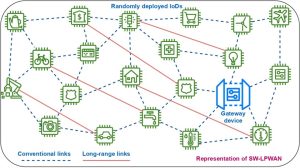
Collaborations
Dr Om Jee Pandey, Assistant professor Department of Electronics Engineering, Indian Institute of Technology, (BHU), Varanasi. e-mail: omjee.ece@iitbhu.ac.inDr Linga Reddy Cenkeramaddi, Professor, Department of Information and Communication Technology, University of Agder, Norway. e-mail:linga.cenkeramaddi@uia.no
Future Research Plan
Continue reading →
In the next phase of research, we will be interested in investigating how the energy efficiency and other quality of service of smart devices in an IoT setting can be improved if they are partially or completely mobile. - An Inventive Navigation System for the Visually Impaired May 15, 2024
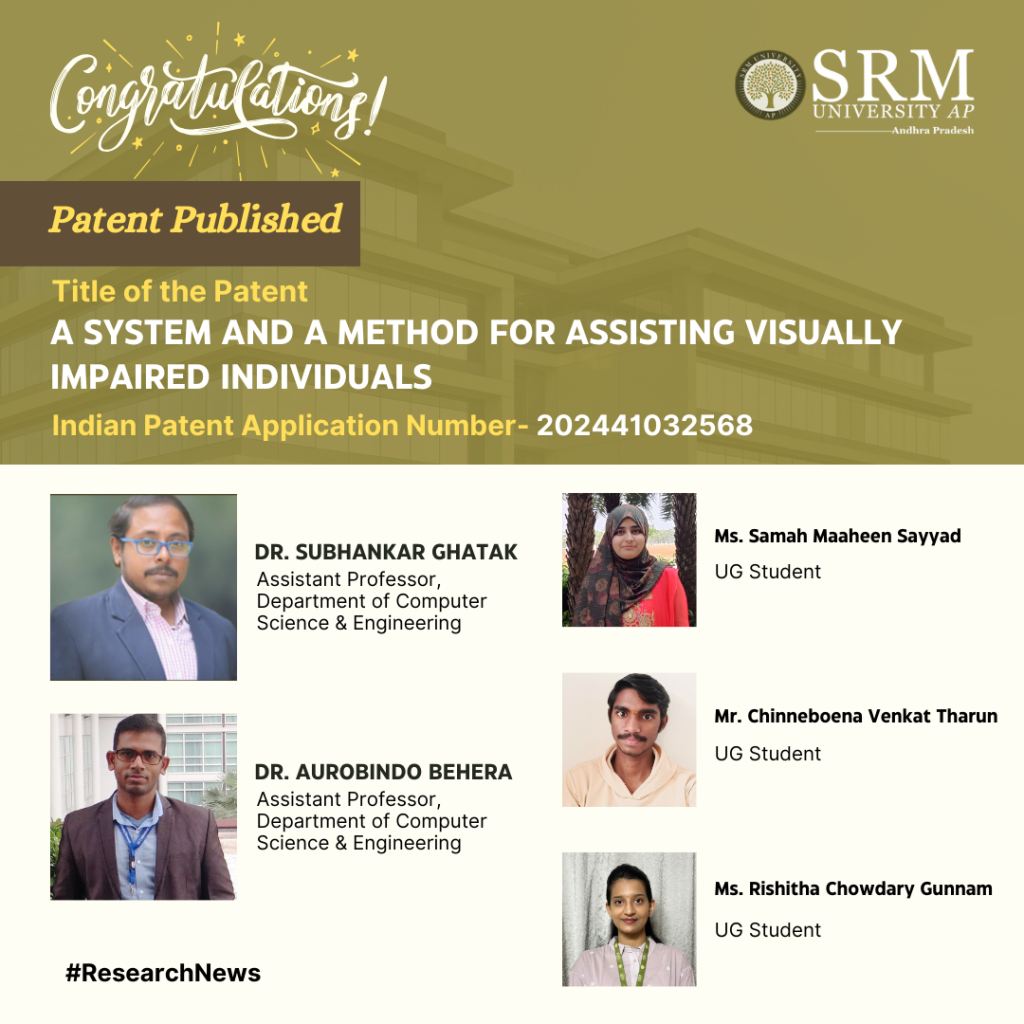
The Department of Computer Science and Engineering is proud to announce that the patent titled “A System and a Method for Assisting Visually Impaired Individuals” has been published by Dr Subhankar Ghatak and Dr Aurobindo Behera, Asst Professors, along with UG students, Mr Samah Maaheen Sayyad, Mr Chinneboena Venkat Tharun, and Ms Rishitha Chowdary Gunnam. Their patent introduces a smart solution to help visually impaired people navigate busy streets more safely. The research team uses cloud technology to turn this visual information into helpful vocal instructions that the users can hear through their mobile phones. These instructions describe things like traffic signals, crosswalks, and obstacles, making it easier for them to move around independently, making way for an inclusive society.
Abstract
This patent proposes a novel solution to ease navigation for visually impaired individuals. It integrates cloud technology, computer vision algorithms, and Deep Learning Algorithms to convert real-time visual data into vocal cues delivered through a mobile app. The system employs wearable cameras to capture visual information, processes it on the cloud, and delivers relevant auditory prompts to aid navigation, enhancing spatial awareness and safety for visually impaired users.
Practical implementation/Social implications of the research
The practical implementation of the research involves several key components.
- Developing or optimising wearable camera devices that are comfortable and subtle for visually impaired individuals. These cameras should be capable of capturing high-quality real-time visual data.
- A robust cloud infrastructure is required to process this data quickly and efficiently using advanced computer vision algorithms and deep learning algorithms.
- Design and develop a user-friendly mobile application that delivers processed visual information as vocal cues in real-time. This application should be intuitive, customisable, and accessible to visually impaired users.
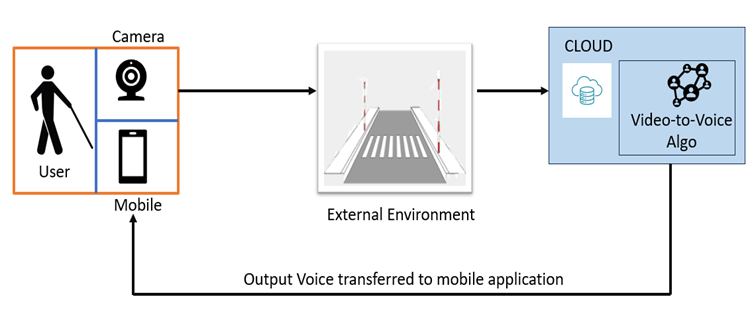
Fig.1: Schematic representation of the proposal
The social implications of implementing this research are significant. We can greatly enhance their independence and quality of life by providing visually impaired individuals with a reliable and efficient navigation aid. Navigating city environments can be challenging and hazardous for the visually impaired, leading to increased dependency and reduced mobility. The research aims to mitigate these challenges by empowering users to navigate confidently and autonomously. This fosters a more inclusive society where individuals with visual impairments can participate actively in urban mobility, employment, and social activities.
In the future, the research cohort plans to further enhance and refine technology to better serve the needs of visually impaired individuals. This includes improving the accuracy and reliability of object recognition and scene understanding algorithms to provide more detailed and contextually relevant vocal cues. Additionally, they aim to explore novel sensor technologies and integration methods to expand the capabilities of our system, such as incorporating haptic feedback for enhanced spatial awareness. Furthermore, we intend to conduct extensive user testing and feedback sessions to iteratively improve the usability and effectiveness of our solution. This user-centric approach will ensure that our technology meets the diverse needs and preferences of visually impaired users in various real-world scenarios.
Moreover, the team is committed to collaborating with stakeholders, including advocacy groups, healthcare professionals, and technology companies, to promote the adoption and dissemination of this technology on a larger scale. By fostering partnerships and engaging with the community, they can maximise the positive impact of their research on the lives of visually impaired individuals worldwide.
Continue reading → - Unlocking Cholesterol Homeostasis: A Mathematical Modelling Perspective May 14, 2024
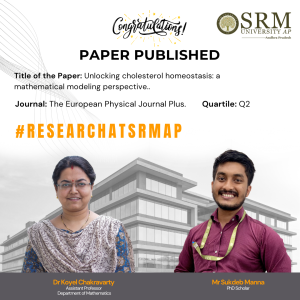 In a significant stride towards understanding cholesterol homeostasis, Dr Koyel Chakravarty, Assistant Professor and Mr Sukdeb Manna, a PhD Scholar in the Department of Mathematics has co-authored a paper titled “Unlocking Cholesterol Homeostasis: A Mathematical Modelling Perspective.” The paper has been published in the esteemed journal, The European Physical Journal Plus, with an impact factor of 3.4. This collaborative effort showcases the innovative application of mathematical modelling in unravelling the complexities of cholesterol regulation within the body.
In a significant stride towards understanding cholesterol homeostasis, Dr Koyel Chakravarty, Assistant Professor and Mr Sukdeb Manna, a PhD Scholar in the Department of Mathematics has co-authored a paper titled “Unlocking Cholesterol Homeostasis: A Mathematical Modelling Perspective.” The paper has been published in the esteemed journal, The European Physical Journal Plus, with an impact factor of 3.4. This collaborative effort showcases the innovative application of mathematical modelling in unravelling the complexities of cholesterol regulation within the body.The research not only contributes to the existing body of knowledge in this field but also sheds light on potential avenues for further exploration and understanding. Dr Chakravarty and Mr. Manna’s work underscores the importance of interdisciplinary approaches in scientific research and highlights SRM University-AP’s commitment to fostering cutting-edge research and innovation.
Their collaborative efforts serve as an inspiration to aspiring researchers and underscore the university’s dedication to pushing the boundaries of knowledge and discovery. Congratulations to Dr Chakravarty and Mr Manna on this remarkable achievement, and we look forward to more groundbreaking contributions from them in the future.
Abstract:
Limited progress in the mathematical modelling of cholesterol transport systems is hampering novel therapeutic interventions. This issue is addressed by the present study through precise design, employing four compartmental models to elucidate cholesterol dynamics in the comprehensive bloodstream. Disparities in medical advancements, particularly in cholesterol-related pathophysiology, are aimed to be bridged, advancing medical science and patient care outcomes.Therapeutic strategies for reducing blood cholesterol are explored by the model, with parameter influences on equilibrium stability revealed through sensitivity analysis. System parameters are effectively manipulated by imposing sensitivity analysis, and pinpointing areas for model refinement. Stability analysis contributes to diverse realistic models, confirming local asymptotic stability. Model efficacy in studying cholesterol transport dynamics is supported by analytical and numerical assessments. The study concludes with the present model validation to substantiate it by comparing the present outcomes with the existing ones.
Explanation of The Research in Layperson’s Terms:
Basically, scientists are having trouble figuring out how to model how cholesterol moves around in the body, which is important for developing new treatments. This study tries to solve that problem by creating detailed models that show how cholesterol behaves in different parts of the bloodstream. The goal is to bridge the gap in medical knowledge about cholesterol-related problems and improve how we treat patients. The models help us understand how different treatments might affect cholesterol levels, and by analyzing them closely, we can figure out which factors are most important. This lets us tweak the models to make them more accurate. The study shows that the models are reliable by testing them both analytically and numerically, and comparing the results to what we already know.
Practical Implementation or the Social Implications of the Research
1. Personalized Medicine: The mathematical models developed in this research could help in designing personalized treatment plans for individuals with high cholesterol levels. By understanding how different factors affect cholesterol dynamics, doctors can tailor therapies to each patient’s specific needs, leading to more effective and targeted treatments.
2. Drug Development: Pharmaceutical companies could use these models to screen potential drugs for lowering cholesterol. By simulating how different compounds interact with cholesterol transport systems, researchers can identify promising candidates for further testing, potentially speeding up the drug development process.
3. Healthcare Cost Reduction: Better understanding of cholesterol dynamics could lead to more efficient use of healthcare resources. By optimizing treatment strategies and preventing complications related to high cholesterol, healthcare costs associated with conditions like heart disease could be reduced, benefiting both individuals and society.
4. Public Health Initiatives: Insights from the research could inform public health initiatives aimed at reducing cholesterol-related diseases. For example, policymakers could use the models to design targeted interventions such as education campaigns promoting healthy lifestyle choices or policies to improve access to cholesterol-lowering medications.
5. Improved Patient Outcomes: Ultimately, the goal of this research is to improve patient outcomes by better understanding and managing cholesterol homeostasis. By developing more accurate models of cholesterol transport dynamics, healthcare providers can make more informed decisions, leading to better control of cholesterol levels and reduced risk of cardiovascular disease and other related conditions.Future Research Plans:
1. Current models may focus on a limited set of factors influencing cholesterol transport. Future research could explore the integration of additional biological factors such as genetic variations, hormonal influences, and dietary components into the models to create a more comprehensive understanding of cholesterol homeostasis.
2. Most existing models of cholesterol transport assume static conditions. Future research could develop dynamic models that capture the time-dependent changes in cholesterol levels in response to various stimuli, such as meals, physical activity, and medication intake. Dynamic models would provide a more accurate representation of real-world cholesterol dynamics and enable the evaluation of time-sensitive interventions.Picture Related to the Research
Continue reading →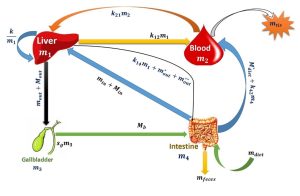
- Dr Manjula R and Students Publish Book Chapter on Machine Learning in 6G Networks May 7, 2024
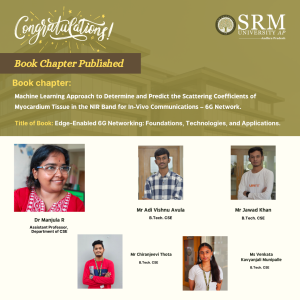 In an exciting development, Dr Manjula R, Assistant Professor in the Department of Computer Science and Engineering, along with B.Tech. students Mr Adi Vishnu Avula, Mr Jawad Khan, Mr Chiranjeevi Thota, and Ms Venkata Kavyanjali Munipalle, have authored a book chapter titled “Machine Learning Approach to Determine and Predict the Scattering Coefficients of Myocardium Tissue in the NIR Band for In-Vivo Communications – 6G Network in book name “Edge-Enabled 6G Networking: Foundations, Technologies, and Applications”.
In an exciting development, Dr Manjula R, Assistant Professor in the Department of Computer Science and Engineering, along with B.Tech. students Mr Adi Vishnu Avula, Mr Jawad Khan, Mr Chiranjeevi Thota, and Ms Venkata Kavyanjali Munipalle, have authored a book chapter titled “Machine Learning Approach to Determine and Predict the Scattering Coefficients of Myocardium Tissue in the NIR Band for In-Vivo Communications – 6G Network in book name “Edge-Enabled 6G Networking: Foundations, Technologies, and Applications”.This achievement highlights the innovative research and collaboration showcase the dedication and expertise of both faculty and students in the field of computer science and engineering. The book chapter explores the cutting-edge advancements in 6G networking and its potential applications, shedding light on the future of communication technologies.
We congratulate Dr Manjula R and the team of talented students on this significant accomplishment and look forward to seeing more groundbreaking research from them in the future. Stay tuned for more updates on their work and achievements.
Abstract
The accurate calculation of the scattering coefficient of biological tissues (myocardium) is critical for estimating the path losses in prospective 6-G in-vivo Wireless Nano sensor networks (i-WNSN). This research explores machine learning’s potential to promote non-invasive procedures and improve in-vivo diagnostic system’s accuracy while determining myocardium’s scattering properties in the Near Infrared (NIR) frequency. We begin by presenting the theoretical model used to estimate and calculate scattering coefficients in the NIR region of the EM spectrum. We then provide numerical simulation results using the scattering coefficient model, followed by machine learning models such as Linear Regression, Polynomial Regression, Gradient Boost and ANN (Artificial Neural Network) to estimate the scattering coefficients in the wavelength range 600-900 nm.
We next contrast the values provided by the analytical model with those predicted via machine learning models. In addition, we also investigate the potential of machine learning models in producing new data sets using data expansion techniques to forecast the scattering coefficient values of the unavailable data sets. Our inference is that machine learning models are able to estimate the scattering coefficients with very high accuracy with gradient boosting performing better than other three models. However, when it comes to the prediction of the extrapolated data, ANN is performing better than other three models.
Keywords: 6G, In-vivo, Dielectric Constant, Nano Networks, Scattering Coefficient, Machine Learning.
Significance of Book Chapter
The human heart is a vital organ of the cardiovascular system and is very crucial for any living being. However, this organ is prone to several diseases—Cardiovascular Disease (CVD)—an umbrella term. CVDs are the set of the heart diseases that comprises heart attack, cardiac arrest, arrhythmias, cardiomyopathy, atherosclerosis to name a few. CVD alone account for most of the deaths across the globe and is estimated reach 23.3 million deaths due to CVD by 2030. Early detection and diagnosis of CVD is the ultimate solution to mitigate these death rates. Current diagnostic tests include, however not the exhaustive list, ECG, blood test, cardiac x-ray, angiogram.
The limitations of these techniques include bulkiness of the equipment, cost, tests are suggested only when things are in critical stage. To alleviate these issues, we are now blessed with on-body or wearable devices such as smart watches that collect timely information about the cardiac health parameters and notify the user in a real-time. However, these smart watches do not have the capability to directly detect the presence of plaque in the arteries that leads to atherosclerosis. These devices have the capability to track certain health parameters such as heart rate, blood pressure, other activity levels, any deviation in the measured values of these parameters from the normal values might give an indication of cardiac health issues. This requires a formal diagnostics test such as cardiac catheterization or cardiac x-ray leading to the original problem.
Therefore, in this work we aim to mitigate these issues by proposing the usage of prospective medical grade nanorobots—called nanosurgeons, that can provide real-time live information on the health condition of the internal body. Particularly, our work assumes that these tiny nanobots are injected into the cardiovascular system that keep circulating along with the blood to gather health information. Such nanosized robots are typically expected to work in the terahertz band owing to their size. At such high frequency, the terahertz signals are prone to high path losses due to spreading, absorption and scattering of the signal during propagation. Our work aims at understanding these losses, especially the scattering losses, of the terahertz signal in the NIR band (600-900 nm) using the existing models, analytically. Further, to understand the strength of machine learning in predicting these scattering losses, we also carryout simulation work to estimate and predict the scattering losses using Linear Regression, Polynomial Regression, Gradient Boost and Artificial Neural Network (ANN) models.
Our preliminary investigation suggests scattering losses are minimal in NIR band and machine learning can be seen as a potential candidate for perdiction of scattering losses using the available experimental data as well as using data augmentation techniques to predict the scattering losses at those frequencies for which either experimental data is not available or can prevent the use of costly equipment to determine these parameters.
Continue reading → - Patent Granted for Research in Developing Tarnish Resistant Silver Alloys May 7, 2024
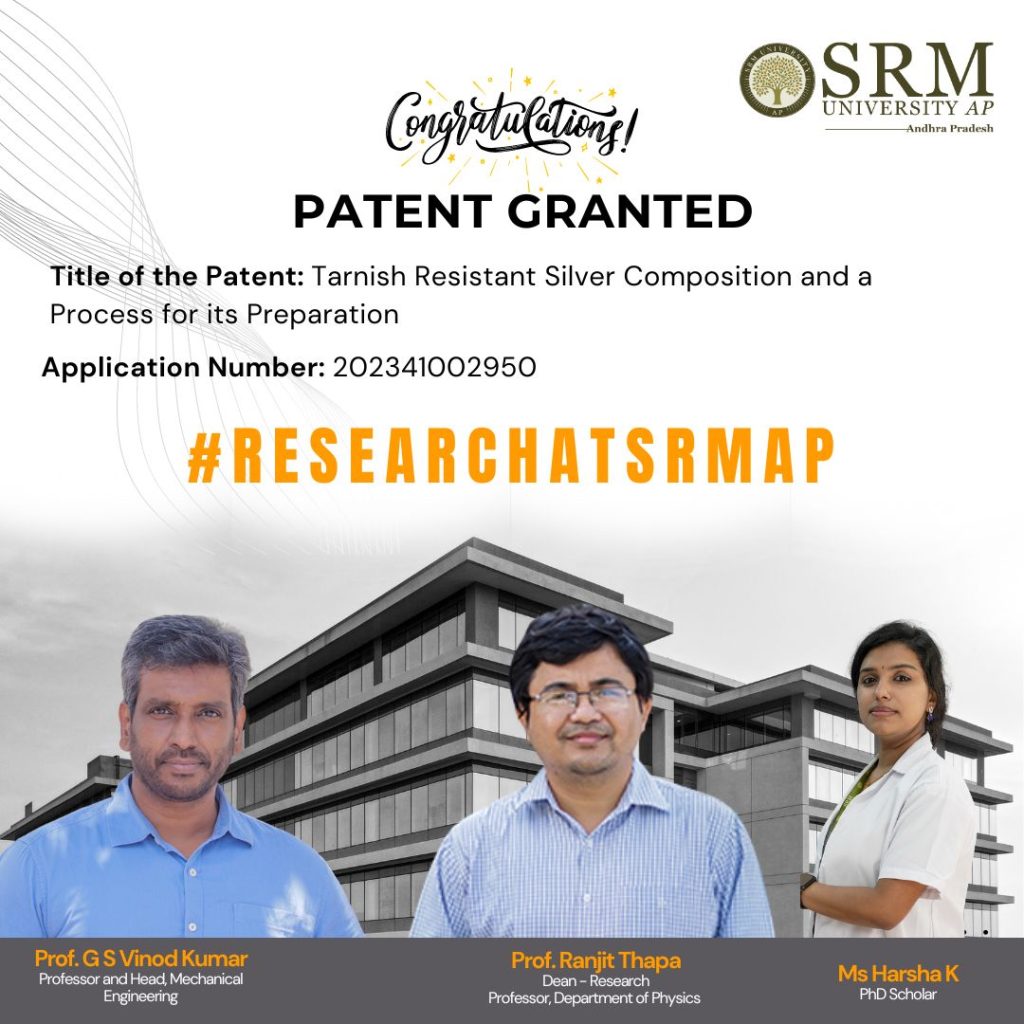
Yet another groundbreaking achievement for the researchers at SRM University-AP! Prof. Ranjit Thapa, Dean-Research and Professor, Department of Physics, Prof. G S Vinod Kumar, Professor and Head, Department of Mechanical Engineering and Ms Harsha K, PhD scholar, continue to make their mark in the university’s excellent research legacy by having their patent “Tarnish Resistant Silver Composition and a Process for its Preparation” being granted by the Indian Patent Office. This innovative research team has used density functional theory to explain the tarnishing of silver. Their work also focuses on finding alloying elements that protect silver.
Abstract
The research is on the development of tarnish-resistant silver alloys from an experimental and computational perspective. With time, silver atoms on the surface of the metal undergo sulphidation and form Ag2S molecules. These particles will accumulate to form a layer whose thickness goes beyond 10nm, and then the human eye will start to find a discolouration on the surface of silver, which is tarnish. The stain colour changes from light yellow to dark brown. This reduces the lustre of silver and makes them aesthetically non-pleasing. The silver jewellery and articles manufacturing industry suffers from this tarnishing as it leads to the loss of material and money and ruins intricate designs made of silver. The research study attempts the problem by alloying silver with appropriate elements, which are computationally checked and verified. The team works with alloying elements such as Cu, Zn, Ge, Ti, Zr, Mg, Al, and Be. Along with tarnish resistance, the proposed alloys maintain high reflectance, good hardness, and excellent workability when spinning.
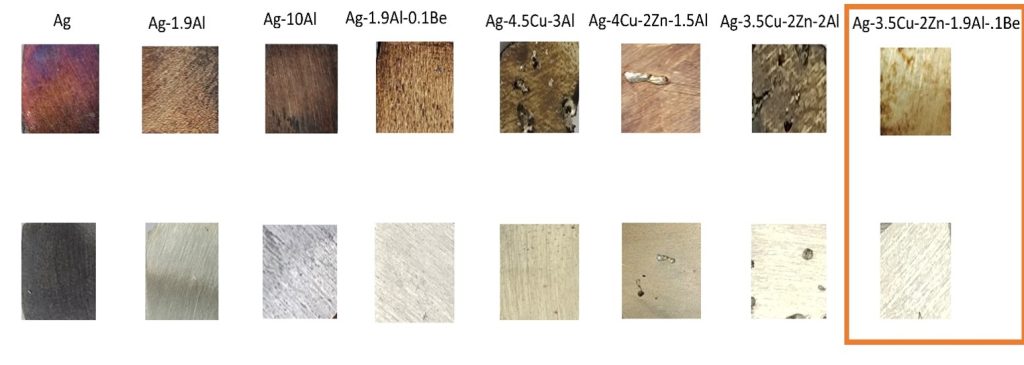
Figure.1 The images of different silver alloys after accelerated tarnish test in as-cast condition (first row) and after undergoing passivation heat treatment at 450°C for 1 hour in the presence of oxygen (second row).
Practical implementation/social implications of the research
- Stainless silver is in demand as customers want their precious metal articles to be kept for a longer time as heirlooms. So, the product that we could develop out of our composition will be making more demand for silver.
- It can increase the market potential of silver.
- It can lead to more innovations in the jewellery industry.
Collaborations
- Waman Hari Pethe
- Ashlyn Chemmannur
- TITAN
The team would continue to work on the scope of research to develop more tarnish-resistant compositions, improve the tensile strength, scratch resistance, surface hardness, and workability of silver alloys and find novel elements which can add to desirable properties of silver.
Continue reading →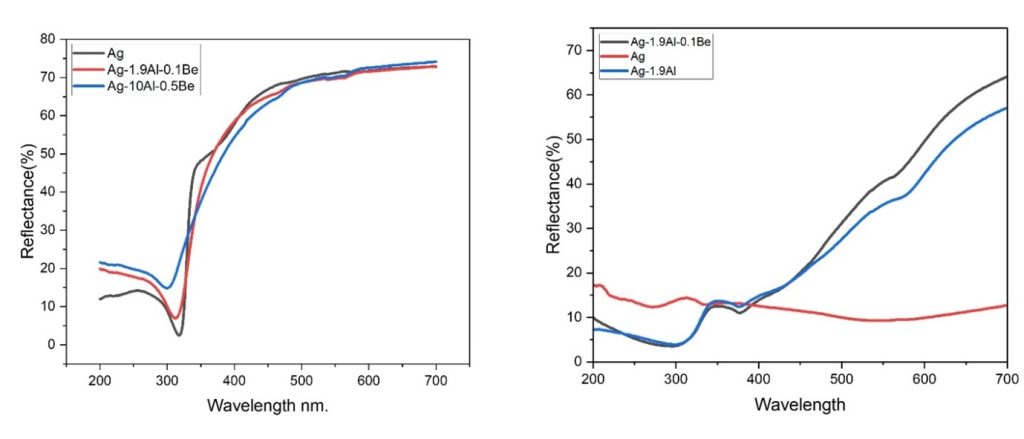
Figure.2 Reflectance of alloys (a) before tarnish test (b) after tarnish test
- A Review of Non-isolated BDC Topologies for Renewable Energy Systems May 7, 2024
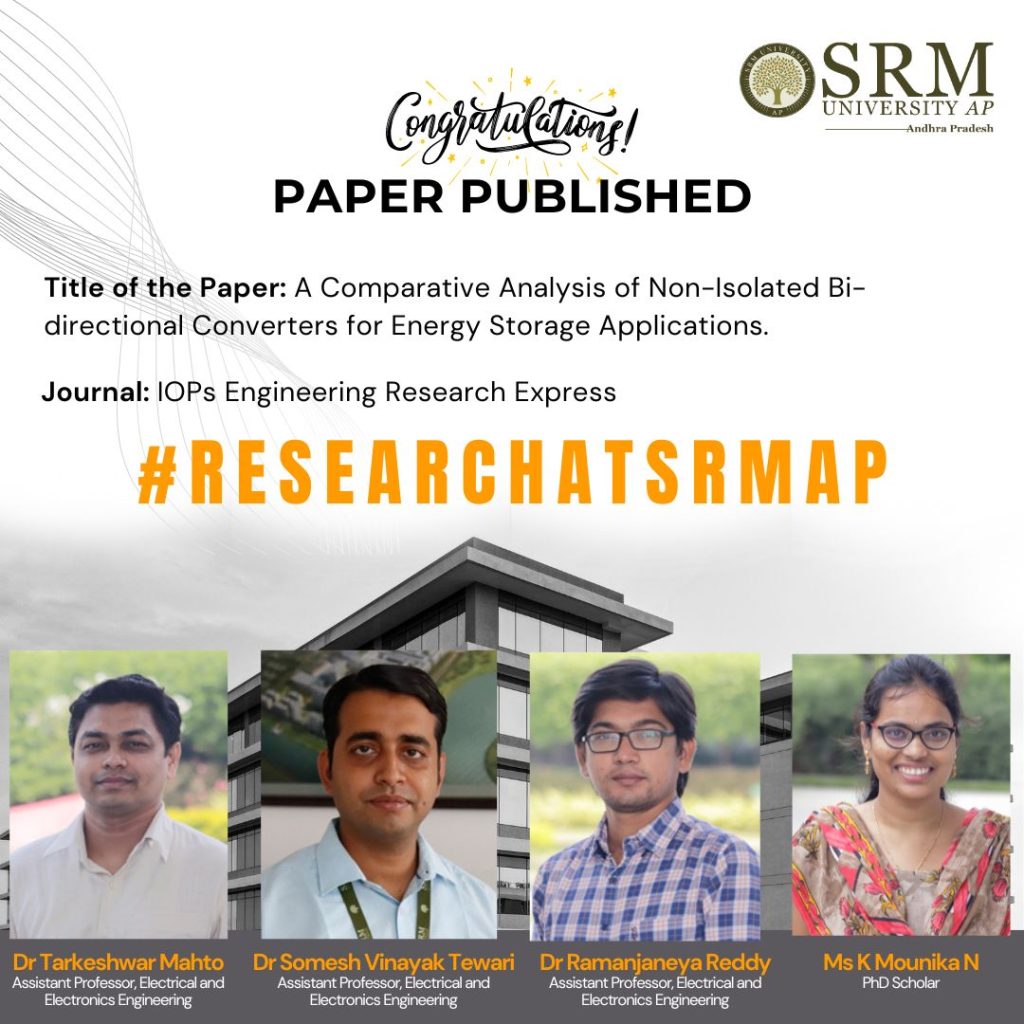
The Department of Electrical and Electronics Engineering is glad to announce that the paper titled “A Comparative Analysis of Non-Isolated Bi-directional Converters for Energy Storage Applications”, authored by Dr Tarkeshwar Mahto, Dr Somesh Vinayak Tewari, Dr Ramanjaneya Reddy, Assistant Professors and Ms K Mounika Nagabushanam, PhD Scholar has been published in the IOPs Engineering Research Express having an impact factor of 1.7. The paper explores various non-isolated bi-directional DC-DC converter topologies for renewable energy systems, providing insights into their performance and suitability for different applications.
Abstract
Bi-directional DC-DC converters (BDC) are required for power flow regulation between storage devices and DC buses in renewable energy-based distributed generation systems. The fundamental requirements of the BDC are simple structure, reduced switching components, a wide range of voltage gain, low voltage stress, high efficiency, and reduced size. There are different BDC topologies for various applications based on the requirements in the literature. Various BDCs are categorised according to their impedance networks. Isolated BDC converters are large due to high-frequency transformers and hence used for static energy storage applications whereas non-isolated BDC is lightweight and suitable for dynamic applications like electric vehicles. This paper reviews types of non-isolated BDC topologies. The performance of five non-isolated BDC converters under steady-state conditions is evaluated using theoretical analysis. On this basis, the suitability of BDC for different applications is discussed. Further advantages and limitations of converters are discussed by using comparative analysis. The optimisation of BDC for distributed generation systems from the perspectives of wide voltage gain, low electromagnetic interference, and low cost with higher efficiency is identified. Theoretical analysis of the converters is validated by simulating 200W converters in MATLAB Simulink.
The main challenges with energy storage systems are frequent failures due to frequent charging and discharging and the volume of the power converter. The team plans to:
- To design a converter with fewer components, low switching stresses, high power transfer capability, and higher efficiency to deliver continuous current to the energy storage system.
- To work on various control techniques to keep the DC link voltage of the propulsion system constant.
Link to the article
Continue reading →


